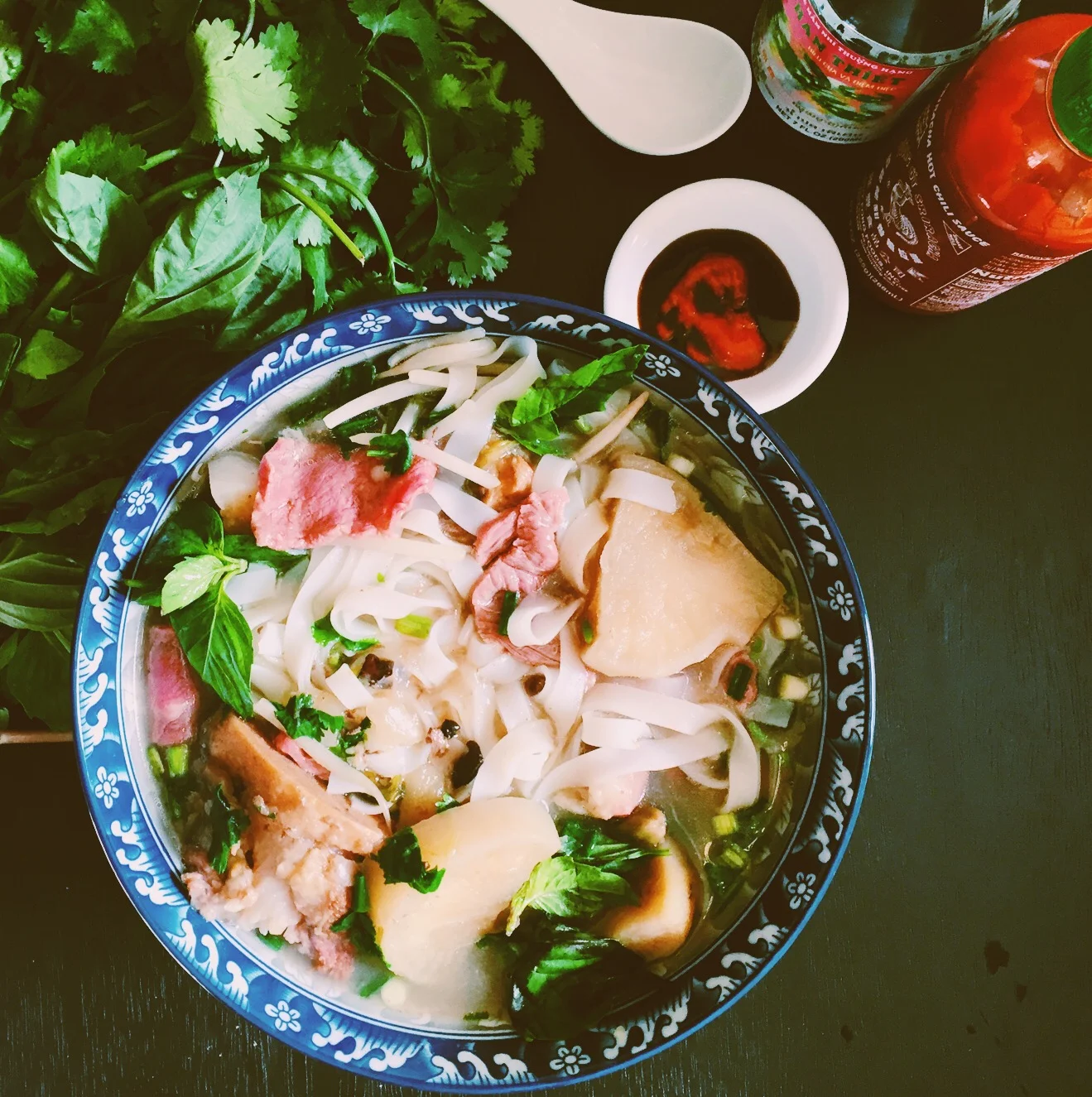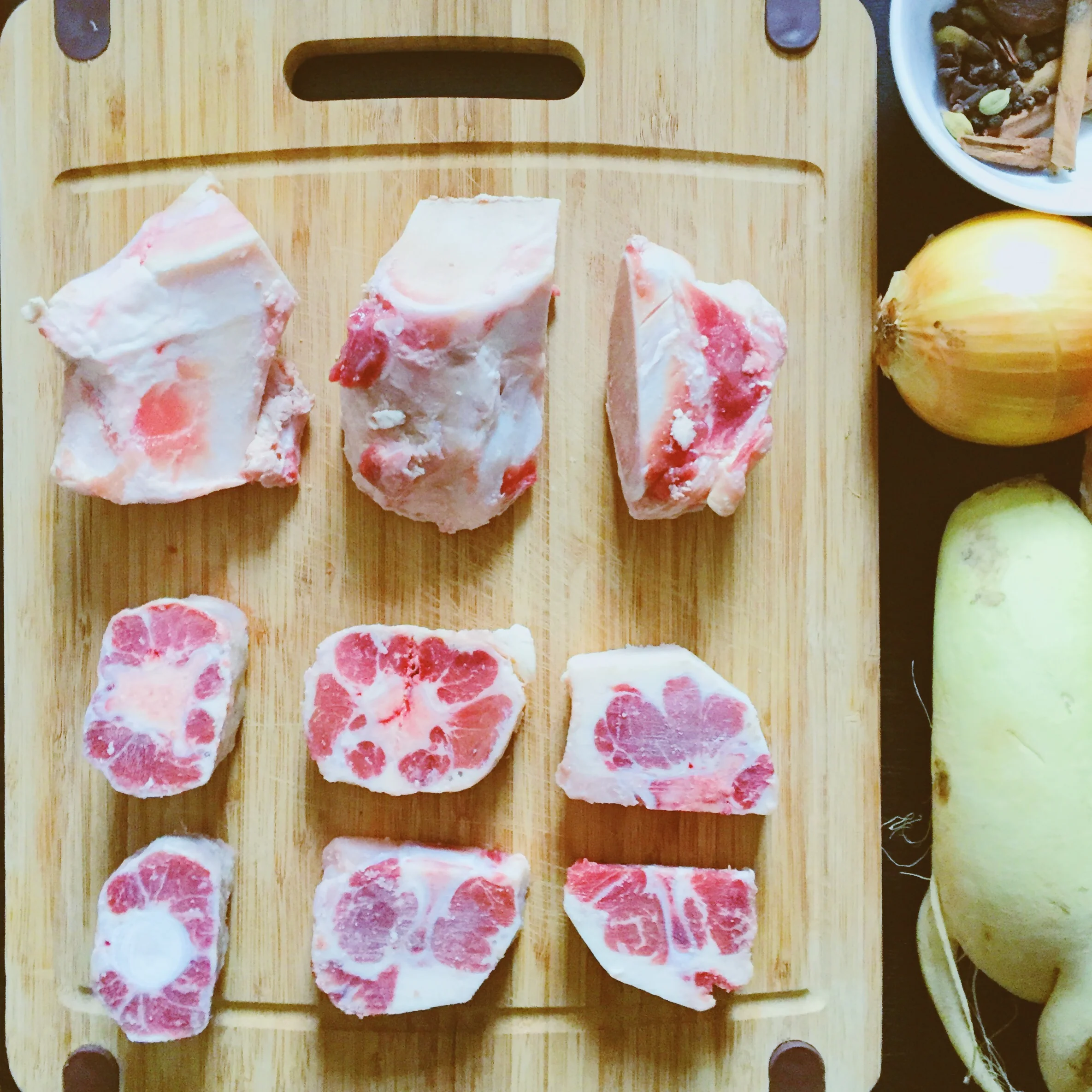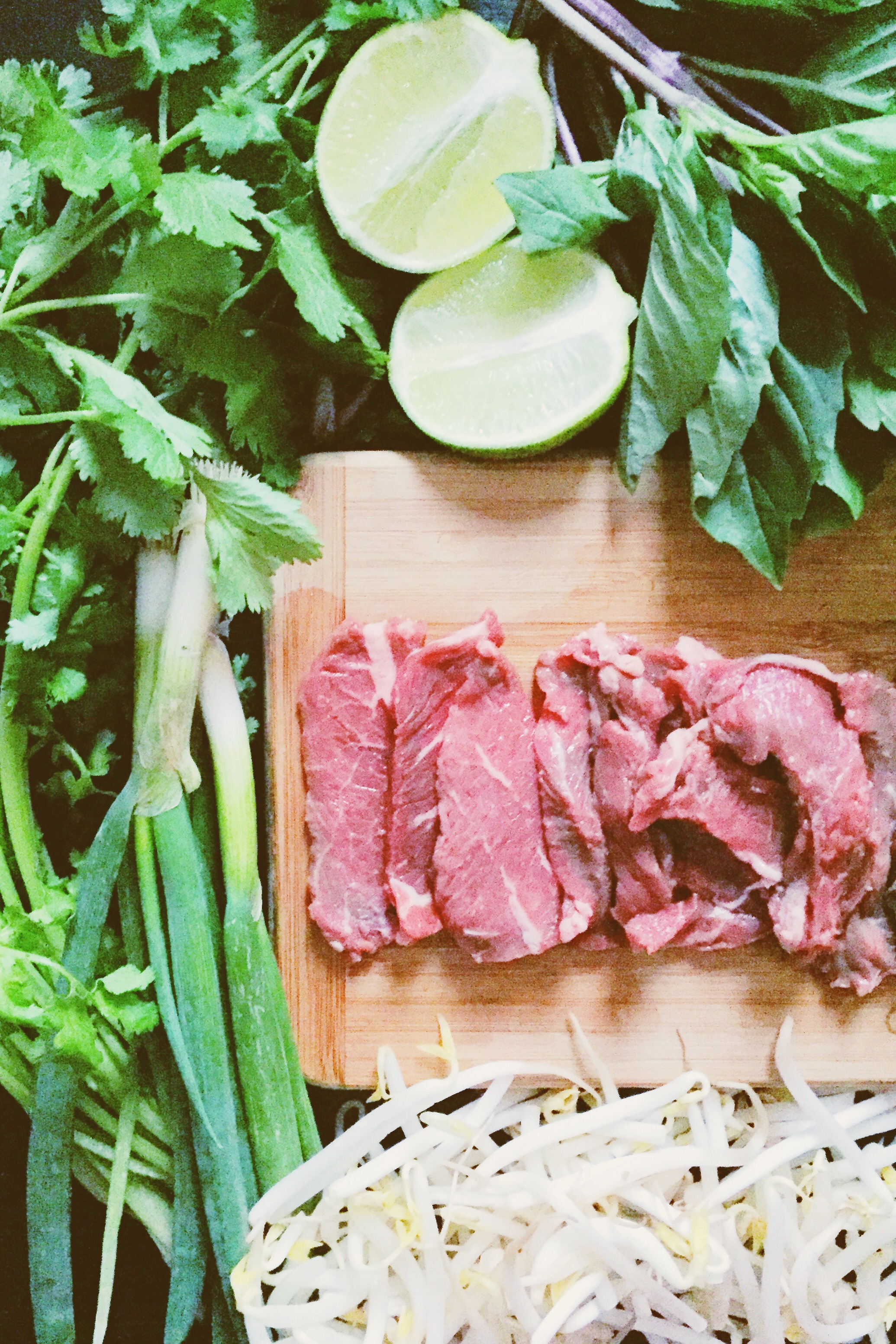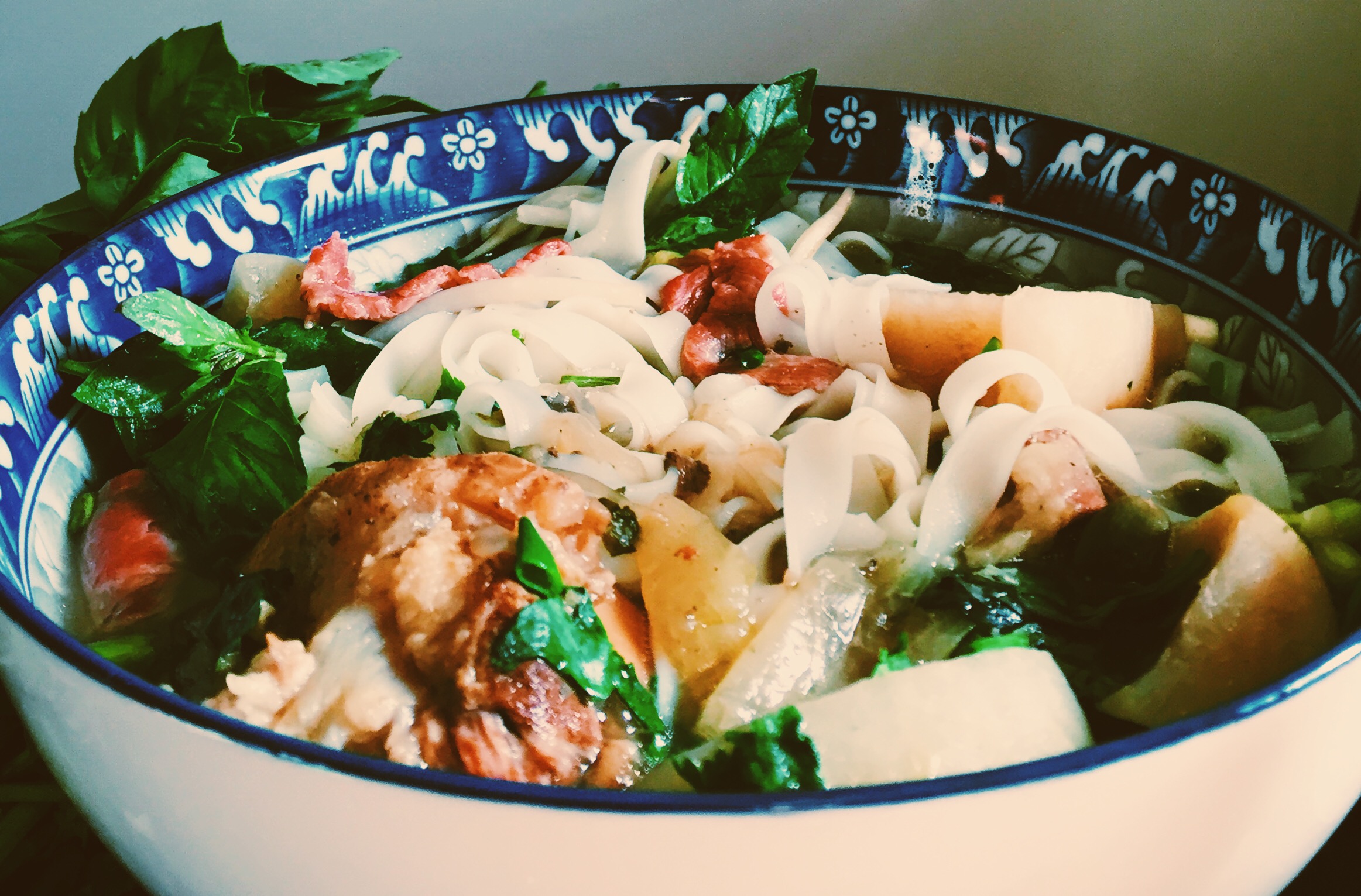Pho
"Proportions don't matter." –Mom
Yeah, she's wrong—I say that with certainty because I used her recommended amount of spices with an arbitrary nine cups of water and, although good, the flavor of the pho could have popped more against the intentional blandness of the rice noodles. I doubled the spices in the recipe below.
The dish itself isn't tricky to make once the proportions match, but boy is it time consuming—I suddenly understood why Momofuku and Ippudo charge $16 for a bowl of ramen. And like ramen, there are many renditions of pho. The most common, phở bò, uses beef broth as the base. Phở gà, made with chicken, came later for those who prefer a lighter flavor.
Some say the classic Vietnamese street dish originated with French pot-au-feu, when the Vietnamese lover of a French soldier attempted to make him the dish. Another theory states pho originated with Cantonese immigrants in the Northern Vietnamese city of Hanoi, derived from the well-loved beef noodle soup ngau yuk fun, using scraps of beef leftover from the butcher after serving the French. The latter may be less romantic, but it has my vote because:
1. We make ngau yuk fun at home and it IS very similar to pho—to the point where I confused the two soup dishes as a kid, like a lot.
2. Dad and his 13 siblings were part of the thriving Cantonese Chinese immigrant community in Vietnam*, and Dad grew up with an uncle who made his fortune in the restaurant biz. I'm not saying we invented pho, but I'm also not saying that we weren't at the forefront of the dish's arrival.
Today I'm sharing Dad's version, learned from his school days or lack thereof (Dad skipped school to hang with the chefs of the restaurants his uncle owned). It's traditional, so it's a little different from what you would typically get in the States. And the condiments are EVERYTHING, so don't skimp.
*Fun tidbit, I'm actually a fake Phan—my last name is supposed to be Poon since I'm Chinese. When Dad immigrated to the U.S. he had to jot down a last name, and coming from Vietnam he was told to say Phan by the translator. My extended family has legally changed it since, but Dad was like ¯\_(ツ)_/¯, so I continue to be Phan-tastic. I don't hate it.
Prep: 20 minutes Cook: 6 hours
INGREDIENTS (SERVES 2–3)
Broth
| 1 1/2 lbs beef bone marrow | 8 whole cardamom |
| 1 lb oxtail | 4 whole star anise |
| 1 yellow onions | 1/2 tbsp whole cloves |
| 1 three inch ginger | 1 tbsp black peppercorns |
| 1 whole nutmeg | 2 lbs daikon |
| 2 cinnamon sticks | 1/2 bag of bánh phở noodles |
| 1 tbsp fennel seed | 3 tbsp fish sauce |
| 1 tbsp whole coriander |
+ Cheesecloth or soaking bag for spices
Condiments
| 1/2 lb filet mignon | bean sprouts to taste |
| 1/2 lime | chopped chives to taste |
| 2 stalks scallion | fried red onions to taste |
| 4 stalks cilantro | sriracha to taste |
| 1 Thai chili pepper | fish sauce to taste |
| Thai basil to taste |
PREPARE
1. Bring two large pots of water to boil. Each pot should be about 3/4 full if using a 5-quart pot (about 9 cups). When the first pot comes to a rolling boil, toss in the bones for about four minutes. Take out bones and wash with cold water. This will take out any impurities. A mark of a good bowl of pho is the clear broth.
2. While you’re waiting for the pots of water to boil, slice your ginger length-wise and give it a good smash with your knife to release the juices. Then char the ginger and onions on your stove top.
3. When the second pot of water comes to a boil, toss in the bone marrow, oxtail, ginger, and onion.
COOK
1. Turn down the mixture to a slow simmer for about two hours.
2. Combine all the spices into a small frying pan and roast until fragrant (5-ish minutes). Take a cheesecloth and toss in the spices, tying it tight with butcher twine.
3. Put on Netflix—you should be able to fit in either two Gilmore Girls episodes or at least a few episodes of Russian Doll, at least enough to get you hooked.
4. After two hours, skim off any impurities that may have formed. Toss in fish sauce and spice pouch. Stay at a low simmer for another two hours.
5. Meanwhile, use a potato peeler on the daikon and then chop into two-inch-thick pieces.
4. Thinly slice sirloin steak. Set aside.
5. Chop scallion, cilantro, and chive. Slice up the Thai chili pepper. Set aside.
6. Slice your lime, wash the bean sprouts, and separate the Thai basil and mint from the stem. Set aside.
7. When the two hours have come and gone, place the daikon in the broth. Daikon will up your pho game by 100 points. Promise. Taste the broth and add more fish sauce as needed. Simmer until daikon has turned almost translucent and is soft (30-40 minutes). Continually check back on the broth, if the flavor starts to feel too strong, take out the spice bag. I personally like keeping it in for more flavor, but not everyone does.
8. Prepare rice noodles by bringing a pot of water to boil and letting them simmer until soft (about 6-8 minutes).
EAT
Ah, the best part has arrived! It's now hour five. Take a large bowl and dump in desired noodle amount along with cilantro, scallions, chives, bean sprouts, and Thai basil. Place sliced steak in ladle and submerge into broth for about 1 minute, then toss the meat in your bowl.
Now take that ladle and fill it with the beautiful broth, scooping daikon and onion along with it, and add it all to your bowl of noodles. The heat from the broth will continue to cook the steak* as you mix everything together. Then add fried red onions, more fish sauce, scallion, cilantro, mint, basil, and sriracha. Top off with a squeeze of lime. Mix well and enjoy!
*To the side of my pho, I like to keep a hoisin sauce/sriracha mixture for the beef.




